NFT Legal Classification: Understanding the Legal Landscape
What Are NFTs and Why Do They Matter?
The term NFT (Non-Fungible Token) has become a buzzword in the digital world. But, with over 5.6 billion USD in sales recorded in 2021 alone, it raises an essential question: What legal classification do NFTs fall under? Understanding this classification is crucial for artists, collectors, and businesses venturing into this innovative domain.
Understanding the Types of Legal Classifications for NFTs
NFTs can be categorized under various legal classifications based on their attributes:
- Property Law – NFTs as digital assets may be perceived similarly to tangible property.
- Securities Law – If an NFT represents a stake in a project or business, it could be classified as a security.
- Intellectual Property Rights – Owners of NFTs must understand the corresponding copyright and trademark implications.
- Taxation Regulations – Jurisdictions may have specific tax rules that apply to NFTs, such as capital gains tax.
The Role of Compliance in NFTs: A Must for Buyers and Creators
Given their diverse legal classifications, compliance is critical. For instance, artists minting NFTs associated with their artwork must ensure they are not infringing on copyright laws. Buyers, on the other hand, should confirm the ownership rights attached to an NFT.

For example, a popular NFT marketplace such as OpenSea has a compliance framework in place that addresses these legal issues. Compliance helps protect the interests of all parties involved.
How International Regulations Affect NFT Transactions
As global NFT adoption surges, countries are beginning to formulate regulations. For instance:
- The European Union is exploring comprehensive regulations encompassing cryptocurrencies and NFTs to create a unified legal framework.
- United States regulators are looking at how existing financial laws can adapt to cover new NFT-related risks.
This evolving legal landscape means that those in the NFT space need to stay informed. Allocating time for research can enhance your understanding of NFT compliance.
Your Next Steps in Navigating the NFT Legal Framework
As you delve deeper into NFTs, consider the following actions:
- Educate yourself on local regulations in your region regarding NFT transactions.
- Engage with legal professionals to understand how property law and intellectual property rights apply to your NFTs.
- Stay updated on global regulatory changes to ensure compliance and mitigate risks associated with NFT transactions.
Ignoring these factors could lead to legal ramifications down the line, and it’s better to be safe than sorry.
In summary, the legal classification of NFTs is a multifaceted issue that affects everyone from individual collectors to large corporations. Don’t navigate this new territory alone—join the conversation and get informed!
Conclusion: Empower Yourself with Knowledge
As the NFT landscape continues to evolve, staying informed about its legal classification is essential. Protect your interests and invest wisely. Ready to dive deeper into NFT regulations? Schedule a consultation with a legal expert today!
For further details on cryptocurrency regulations and compliance, visit our NFT category or check out our guides on legal considerations in the crypto world.




